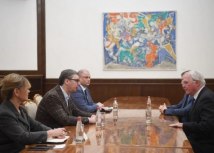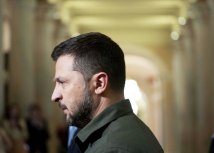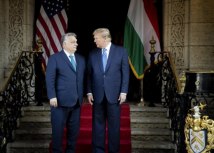"U.S. not exerting pressure over Kosovo"
"The issue of recognition is a sovereign decision that countries make. We don’t put pressure on anybody, there are no threats, no inducements."
Guest:James Steinberg, Journalist: Ljubica GojgićB92: Mr. Steinberg, you’ve arrived from Sarajevo, so I’ll first ask what is more important for the U.S., Bosnia or Kosovo?
Steinberg: Oh, I don’t think we have a comparison here. Our commitment is to build a strong relationship with all the countries of this region, to help all the people achieve bright future, stability, peace and prosperity. And I think working on this all together, recognizing that this is a region where need to build cooperation and cooperative strategy is our overall approach.
B92: Going back to Bosnia, what are your expectations from Serbia? What would you like to see Serbia do in contributing to that strategy for the region when it comes to Bosnia?
Steinberg: We’re very appreciative of a leadership that President (Boris) Tadić and the government here have shown in helping us to work with the parties in Bosnia, to take the practical steps they need to build the future for their own people, to help chart a path for Bosnia into the EU, and into NATO, the aspirations of the Bosnian people, and I think that the strong commitment that we have together with Serbia to work to move forward within the Dayton framework to secure a future for Bosnia, it’s a common effort and I’ve been appreciative and had good conversation with President Tadić about that last night.
B92: Is it true that in a way Washington counts on Serbia to sometimes influence on Mr. (Milorad) Dodik when Mr. Dodik is being less constructive than you would like?
Steinberg: I think that what’s been important is that all the leaders of the region from the former Yugoslavia are working together to help support the effort that we are working on hand in hand with the EU in Bosnia. President Tadić, in Croatia, in Slovenia, I was in Ljubljana on this trip, meeting with PM (Borut) Pahor, all the leaders here want to see Bosnia move forward in a constructive way and each of them has a role to play and positive contribution, they’re working together and sending a common message to all the leaders in Bosnia to try to work together, to make the kinds of decision they need to make to build that future.
B92: Do you accept the position of Mr. Dodik and Serbs in Bosnia that they are willing to cooperate, that they are ready for all sorts of compromises, but they do not want to sacrifice the Republic of Srpska (RS)?
Steinberg: Again, I think that we had very positive meetings with all the political leaders in Bosnia, I meant it was a joint mission with the Spanish FM on behalf of the EU, we met with the leaders of all the political parties there, and we heard a common message from all of them that they share the same aspirations in leading Bosnia into European and trans-Atlantic future, each have some specific sets of concerns, we all have a lot of difficult challenges to find common ground working forward but we believe that we should within the Dayton framework and acceptance of the territorial integrity of Bosnia as the framework within which to move forward in that future. I think that’s a shared view among all the political leaders and now we need to find a way, that’s a practical matter to bridge their differences.
B92: But when you talk about the territorial integrity of Bosnia that nobody puts in question, I think, could you also guarantee the continuing existence of RS?
Steinberg: That’s part of the Dayton framework and there’s nothing that we’re trying to do that would be inconsistent with that.
B92: The news that came from New York yesterday was that the UN secretary-general was concerned with current situation in Kosovo and especially with the plan of Kosovo’s government and Mr. (Pieter) Feith to integrate the north of Kosovo. He said that the plan was drafted without any kind of consultations with the UN and the same we heard from the EU, from Mr. (Spanish FM Miguel Angel) Moratinos earlier that the EU is not behind that plan. Your government supports it and how do you think that contributes to the stability of the region?
Steinberg: I have not had a chance to read the secretary general’s report so I don’t want to comment on specifics of that but I think we’ve made very clear that we support the efforts of the government of Kosovo to move forward in a way that respects the rights of all the citizens of Kosovo. It’s important that all the communities feel engaged and represented, that’s at the heart of the Ahtisaari plan, that’s the heart of what we believe if Kosovo is going to have a future, is to take care and respect the interest of all the people.
B92: The problem is that the Ahtisaari plan was never adopted by the UN, the Security Council, and has been reject by the Serbian government and by the Serbs who live in Kosovo, and they do not want to be integrated in such a society. So, there is a problem there?
Steinberg: No, I think that there is a recognition that we have a multi-ethnic society throughout this region and each of the countries of the Balkans has multiple communities and different voices and we’re not going to have the Balkans in which we will simply try to sort it out solely on ethnic grounds. What’s important for the future of this region, and all the countries in the region is the respect for the right of both majorities and minorities and to build a future for them all within a broader European framework which will allow them to express their interest and have this kind of future.
I think that this is the 21st century vision for the Balkans, it’s a way of overcoming the past and recognition that whatever the political boundaries that they are going to be different communities within those states and that they have to respect rights and interests of all of them. And so I will have an opportunity, I’m going to be in Kosovo later today, in Priština, I will have a chance to meet with some of the Serb mayors, I’m going to go to Gračanica monastery to show that in fact we have a strong support for those communities and we will make clear to the leaders of Kosovo that’s part of our expectation for them in terms of their leadership in that country.
B92: I guess that the president of Serbia and the minister of internal affairs, whom you talked to earlier, do not share your vision for Kosovo for the 21st century.
Steinberg: I think that we obviously have differences of status of Kosovo, we’ve agreed to disagree as Vice President Biden said when he was here, but I think we also recognize that there are some pragmatic steps that we can take such as cooperation with EULEX, and try to deal with some of those practical questions, customs issues and alike that would allow all the people of the region to have a more secure and prosperous future as we continue to try to sort out these political arrangements.
But I think what’s important to recognize here is that what we need to make sure that whatever the political arrangements, whatever our differences are that we have a fundamental respect for the interests and rights of all the people, whether they’re in Serbia, Kosovo, Bosnia, Croatia or any of the other countries in the region.
B92: My final question would be, you said that somewhere, that the U.S. are tirelessly working on spreading the support for the independent Kosovo. Many countries report –countries that did not recognize Kosovo – that they see that as pressure coming from Washington. How important is it to you to have as many countries as possible recognize Kosovo before the decision of the International Court of Justice (ICJ) and what if that court’s legal opinion does not support the independence?
Steinberg: Well, I think it’s important to recognize what the ICJ proceedings are about and what they’re not about. It’s an advisory opinion that’s requested by the General Assembly. Our view is that we strongly support the independence of Kosovo, we believe that it’s consistent with…
B92: Regardless of what the court will say?
Steinberg: The issue of recognition and how states determine recognition is a sovereign decision that countries make. We don’t put pressure on anybody, there are no threats, no inducements. It’s obviously our judgment that that is in the best interest of the people of Kosovo and the region to move forward, to put this behind us and to move forward, so that would be the position of the U.S. We obviously, since that is our view, we advocate it, just as the government in Serbia here advocates to its friends a different view. We’ve agreed to disagree about that, but we don’t put pressure, we don’t try to course anybody.
B92: But why do you advocate an independent Kosovo? It’s not your country, it’s not even your continent, why is it so important?
Steinberg: I think the U.S. has a great stake in this region, I think we have a long history in this region in contributing to peace and stability here, I think we’ve made a great contribution. Because of that stake, because of our involvement we believe that it’s the right thing to do. We’re not the only ones, by the way, majority of the states of the EU take the same view that we do, so this is not an outlined view of the U.S. And so because we think it’s right we advocate for what’s right, I think that’s important for every state to do, just as Serbia advocates for its view.
But I think what’s important is that, although we have differences with the government here about that, we also have strong areas of cooperation and I think it’s important to remember how far the relationships between the U.S. and Serbia have progressed, how much we’re doing together, how strongly we’re working for Serbia’s future trying to support its integration into Europe and its membership in the EU, to support new levels of cooperation between us in an economic, political and security fronts. That’s a very bright future, now we’re stating this very important difference, we actually have an extraordinarily positive center of developments in the 15 months since President (Barack) Obama has been the president.
B92: Thank you very much.
Steinberg: Thank you.



